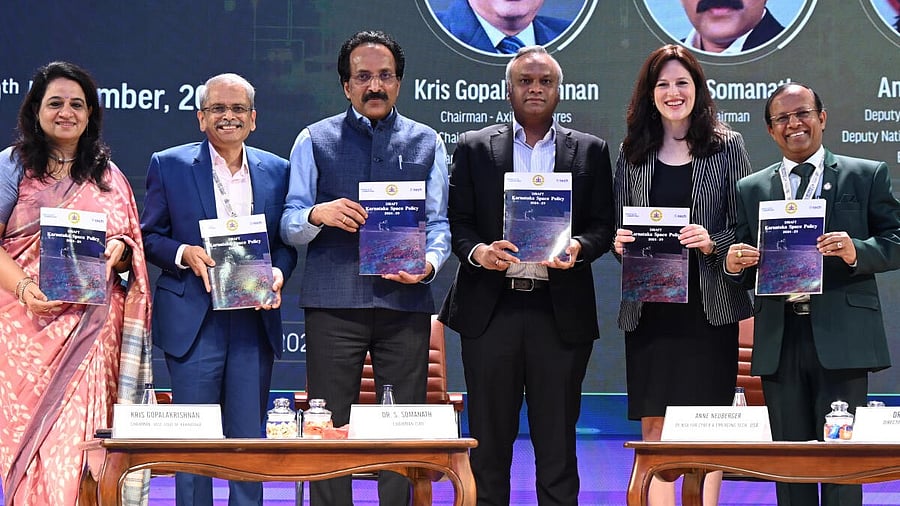
IT & BT Minister Priyank Kharge (third from right) release of Karnataka Space Policy during the 2nd day of 27th Edition of the Bangalore Tech Summit 2024 at Palace in Bengaluru.
DH Photo B K Janardhan
Space legislation in India is at a crossroads with Karnataka becoming the first state to have its own policy on space tech. The Draft Space Tech Policy 2024-2029, recently released in Bengaluru by Indian Space Research Organisation (ISRO) chief S Somanath, is the result of much deliberation between the state Department of Electronics, Information Technology, Biotechnology, and Science & Technology, the Indian National Space Promotion and Authorisation Centre (IN–SPACe) and the Defence Research and Development Organisation (DRDO).
It aims to attract Rs 25,334 crore ($3 billion) in investments into the state’s space ecosystem and establish a space manufacturing cluster of industrial units and testing facilities. The policy seeks to train thousands of students and young professionals and equip them with skills to join the national and international space sectors.
The express intention of the policy is to help Karnataka corner half of the national market share in the space sector. Although this is an ambitious goal, it is not difficult for a state like Karnataka which is dotted with thousands of micro, small and medium enterprises (MSMEs) and space startups.
The largest number of space hi-tech startups in the subcontinent have set up shop in Bengaluru which is a major focus of India’s space effort. The state is home to many upstream firms that make spacecraft and rocket fuel and downstream companies that develop the soft skills needed for a spectrum of applications such as the global positioning system and imagery.
However, the commercial space sector is more focused on the latter in terms of value and returns. As Somanath said while releasing the policy, “We realised it is important to put the effort in the downstream area, where the talent is available in this part of the country, where we can invest and create that capability. This will (in turn) drive the real growth in the upstream segment as well.”
Despite the big strides in space India has made, ISRO currently accounts for a mere 2 per cent of the global space economy. But this has not stopped the space agency from dreaming big. Having privatised space launches and allowed 100 per cent foreign direct investment (FDI) in the manufacture of satellite systems, it aims to increase its share of the global market to 8% by 2030.
Private players have a major role in this thanks to their technology, innovation, and expertise in low-cost operations. They have some spectacular success stories to tell — be it the Chennai-based Agnikul which launched the world’s first fully 3D semi-cryogenic rocket engine or the Hyderabad-based Skyroot which pioneered a 3D-printed bi-propellant liquid rocket engine injector that cuts launch mass by 50 per cent. Given adequate support, they could climb up the value chain to become full-fledged manufacturers of satellites and launch vehicles and help transform India into a global space services destination. To make this happen, however, calls for ‘lateral’ policymaking as the Draft Space Tech Policy 2024-2029 suggests.
Having said that, although the new policy looks good on paper, stakeholders may rightly accord only a cautious welcome considering that it must address some potentially contentious issues. Policymaking is still the exclusive preserve of the Department of Space (DoS) and ISRO who are the sole regulators of the space sector. Since the new policy represents the empowerment of a state government to enact laws in the space-based industry, it becomes imperative for the DoS and ISRO to tweak their roles as the sole enablers of fair competition in the space domain.
Lawmakers may find themselves on a slippery slope as they face what is essentially decentralisation. After all, important pieces of legislation like the Draft Space Activities Bill (2017) and the National Space Transportation Policy (2020) are silent on the role of state governments in helping develop the space sector. Never mind if the Union government actively partners with states such as Telangana to leverage the space technologies of aerospace companies located there.
At the end of the day, technology will always outpace regulation and, therefore, policies must be framed in accordance with the latest technological developments. In other words, no spacefaring nation can afford to have a legacy regulatory system that is not aligned with an increasingly diverse space environment.
If India is to be a major player in the international space domain, it must emulate the best practices in policy making adopted by leading space powers. This includes dropping centralised rule making and allowing states to develop policies — with proper checks and balances, of course, to ensure such exercises do not compromise national security.
In the US, for instance, states have the freedom to enact their own space laws, albeit the final arbiter is the Federal Aviation Administration where the buck finally stops. India should perhaps take a leaf from this notebook and allow states to legislate space-related activity in their jurisdiction under an absolute legal umbrella framework provided by the Union government.
This would engender a healthy competition among the states, while promoting innovation and research and development so crucial for the country to create a strategic space industry.
Disclaimer: The views expressed above are the author's own. They do not necessarily reflect the views of DH.
(Prakash Chandra is former editor of the Indian Defence Review. He writes on aerospace and strategic affairs.)